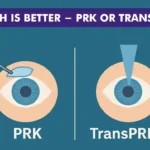We all are aware that the human eye is an organ of vision & is vital to human health and life. The human eye provides sight, enabling us to understand more about the environment. By processing the light objects reflect or emit, the eye allows us to see and understand their shapes, colours, and dimensions. And what if you sense your vision is poor.
For such situations, various eye treatments are available. In this post, you’ll read about two similar procedures: ICL and LASIK (ICL eye surgery vs LASIK).
ICL vs LASIK
Let’s begin with a short comparison between both. ICL is a synthetic lens that works like a contact lens and has a comparable structure to an intraocular lens. To make the ICL undetectable to both the patient and outside observers, it is placed in front of the eye’s natural lens, in the area behind the iris.
ICL is an intraocular surgery, as opposed to LASIK, which is a surface technique that necessitates removing a flap of the cornea. Even while LASIK, a laser procedure to remove glasses, continues to be the most common refractive procedure, ICL is quickly gaining favour with both patients and eye doctors.
What Are Implantable Collamer Lens?
ICL surgery can be thought of as a LASIK substitute. A qualified eye surgeon permanently inserts contact lenses into your eyes through surgery. A cutting-edge, thin, clear lens that acts similarly to a contact lens but is surgically placed into the eye is the Implantable Collamer Lens (ICL). The ICL can be retrieved if necessary, requires no upkeep, and cannot be felt inside the eye. The ICL is implanted in front of the natural lens and behind the iris rather than replacing the native lens.
What Is LASIK?
People who are astigmatic, nearsighted, or farsighted can have their vision corrected by LASIK surgery, which refers to Laser In-Situ Keratomileusis. Your ophthalmologist will alter the structure of your cornea with LASIK by using laser. Laser eye surgery enhances the focus of light on the retina. The purpose of LASIK is to improve your eyesight by correcting your refractive error. LASIK eye surgery may reduce your necessity for eyewear or corrective lenses. In exceptional cases, it might even let you entirely forgo them.
Advantages And Disadvantages
Lasik
This straightforward laser-based method has helped millions of people worldwide see better, proving that it works well. Certain side effects can negatively affect your life, but they are usually small and go away as your body heals.
Pros
- LASIK is rapid and reasonably priced.
- You will spend roughly 30 minutes in your eye doctor’s office if you need to fix both eyes.
- Because LASIK is becoming more popular and less expensive overall, it is a cost-effective procedure. Your vision insurance may cover a portion of the cost.
Cons
- There is a possibility of experiencing adverse effects for six months.
- Halos or glares around lights, dry eyes, and impaired night vision are possible side effects; however, these usually go away within a few months of surgery.
- Since LASIK is regarded as one of the safest surgical procedures, serious problems are sporadic.
ICL
These are not as common as LASIK. Visian ICL can be a better choice if you aren’t a good candidate for LASIK due to certain issues.
Pros
- ICLs are a far better option than LASIK if you have thin corneas, corneal issues including keratoconus, or chronic dry eye.
- The lenses are removable should complications arise, though chances are minimal. LASIK, on the other hand, cannot be undone.
- Even though the surgical procedure for the ICL takes a little longer than LASIK—about 20 minutes for each eye—it is still a quick procedure.
Cons
- When talking about ICL vs LASIK cost, ICL is significantly more expensive than LASIK.
- You have a slightly increased risk of getting cataracts or glaucoma.
Which Is Better: Lasik or ICL?
Since LASIK is more widely available, more doctors are equipped to perform it, and it is less costly. If you are a suitable candidate, your eye doctor would probably advise LASIK over ICL. Consult your optometrist or ophthalmologist about ICL if you are a good candidate or prefer it over LASIK. They can advise you on the course of action that will produce the best long-term results for your scenario.
Why Centre For Sight?
Get in touch with Centre for Sight if you’re interested in receiving either of the two procedures described above. Centre for Sight is committed to giving millions of individuals the freedom to live without glasses and the joy of clear eyesight to improve their quality of life. We are committed to providing our patients with the best ophthalmology care possible using the most advanced diagnostic and therapeutic methods, regardless of their social or financial condition. To find out, contact us.
Article: ICL vs Lasik: What’s the difference?
Author: CFS Editorial Team | Aug 04 2022 | UPDATED 02:00 IST
*The views expressed here are solely those of the author in his private capacity and do not in any way represent the views of Centre for Sight.





